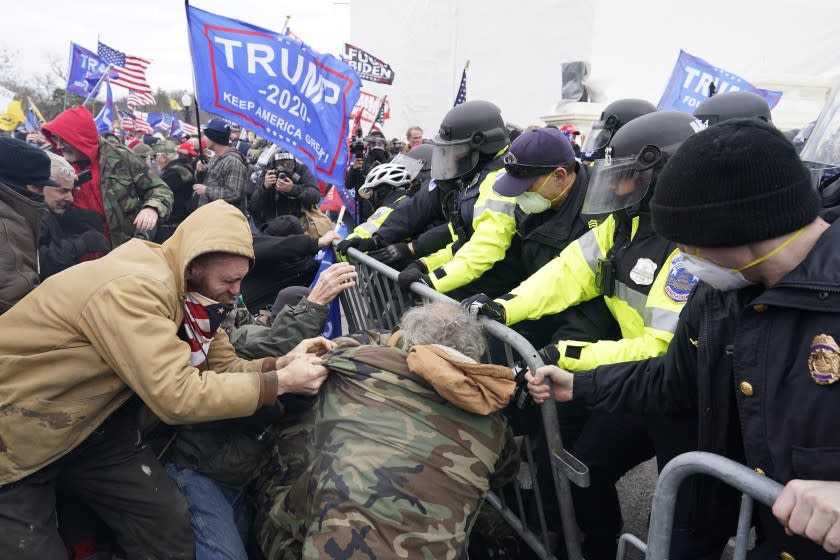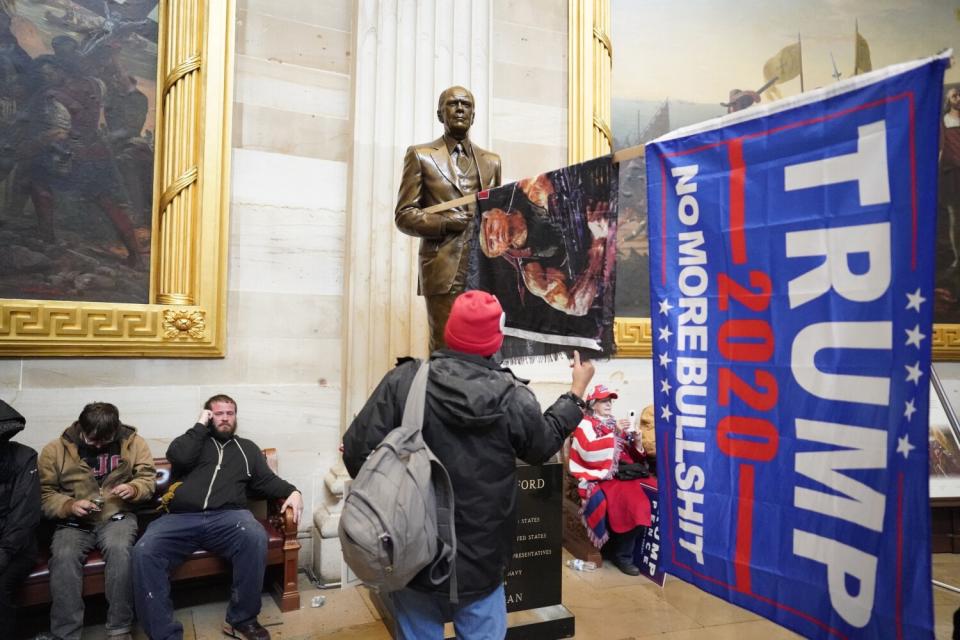'This is not America': World gapes in horror at pro-Trump insurrection

For four years, the world has watched with surprise, horror and in some places glee as President Trump battered one democratic norm after another, exposing the so-called leader of the free world as just another troubled and deeply divided nation.
Still, the planet was little prepared for the stunning scenes Wednesday, when a pro-Trump mob, some flying Confederate flags, stormed the U.S. Capitol to disrupt a congressional vote certifying President-elect Joe Biden’s electoral victory.
“That rhetoric of American exceptionalism has lost a lot of shine in recent years, but nobody expected this to happen,” said Carlos Bravo Regidor, a political analyst and a professor at CIDE, a public research center in Mexico City.
“This is a reckoning or a coming to terms with the fact that the U.S. can no longer be seen as a beacon of hope and democracy.”
Around the world, the insurrection in Washington — stoked by Trump and loyalist Republican lawmakers who have refused to accept his defeat in the November election — served as an ugly coda to a presidency that abandoned democratic allies, embraced autocrats and failed to respond to grave threats to domestic institutions, including the COVID-19 pandemic and Russian hacking.
Even as Congress reconvened Wednesday evening to certify Biden’s win, the turmoil prompted despair among the world’s democratic leaders and pleas for a peaceful transfer of power, and underscored the immense challenges facing the president-elect as he seeks to repair America’s international standing.
“This was an act of violence against the heart of democracy,” Julian Reichelt, the editor in chief of Bild newspaper, Germany’s best-selling tabloid, said in a TV interview. “This hurts everyone who has America in their hearts.”

Biden, in a televised speech, invoked the message that the violent scenes conveyed about the health of the American system.
“The world is watching,” Biden said. “Think of what the rest of the world is looking at.”
The view from afar was one of alarm and sadness. Social media feeds read like a eulogy for the American ideal.
“Our thoughts are with the American people,” wrote Nanaia Mahuta, New Zealand’s foreign affairs minister.
"Disgraceful scenes," British Prime Minister Boris Johnson said.
“In the eyes of the world, American democracy tonight appears under siege,” wrote Josep Borrell Fontelles, the European Union’s high representative for foreign affairs. “This is an unseen assault on US democracy, its institutions and the rule of law. This is not America.”
“Enemies of democracy are celebrating these unbelievable images,” tweeted German Foreign Minister Heiko Maas, who called on Trump and his supporters to “finally accept the decision of the American voters and stop trampling upon democracy.”
Michael Fullilove, executive director of Australia’s Lowy Institute think tank, said leaders of America’s adversaries, including Russia and China, would celebrate the chaos.
“The champagne is flowing in the Kremlin and Zhongnanhai today,” he tweeted.
Beijing's Global Times propaganda outlet could barely contain its delight, using terms like "karma" and "retribution" in a roundup of Chinese social media posts on the events.
The Chinese Embassy in Washington issued a safety reminder to Chinese citizens in the U.S., describing the situation as “severe” and reminding them to “pay attention to safety precautions and carefully [re]consider going to public places.”

For authoritarian governments that have absorbed repeated lectures on democracy and human rights by U.S. administrations, the images of police and National Guard units deployed in Washington’s streets, and mobs in camouflage-print clothing roaming the halls of the Capitol, offered no small amount of schadenfreude. Some couldn’t resist trolling their U.S. critics.
The socialist government of Venezuela — which has survived U.S. sanctions, challenges by Washington-backed opposition groups and a massive humanitarian crisis — said in a statement that it “condemns the political polarization” in the U.S. and hoped the country “can find a new path to stability and social justice.”
In Turkey, where President Recep Tayyip Erdogan has purged political opponents and snuffed out dissent, a leading member of his ruling party, Mustafa Sentop, expressed concern and called for calm.
“As Turkey, we have always been in favor of the law and democracy and we recommend it to everyone,” he wrote.
Even in South Korea, a staunch American ally, there were signs that the closing months of the Trump administration had dented U.S. influence.
In a radio interview, South Korean lawmaker Song Young-gil appeared to refer to his government's recent prohibition on sending propaganda leaflets across the border to North Korea, which some members of Congress criticized as an infringement on free speech.
"It makes me question whether the U.S. is in a position to lecture us on democracy," Song, a member of the liberal Democratic Party of Korea, said in an interview with YTN radio.
He added that developments in the U.S. should serve as a cautionary tale for political polarization in his own country.
“Seeing the situation in the U.S. teaches us that whether you're on the right or left, disregarding the constitution and insisting on your side being right really destroys democracy," he said.
For human rights activists from Hong Kong to Thailand and beyond, who have sometimes taken inspiration from America’s model of representative government, the unrest underscored the difficulty of preserving democratic rule in the face of leaders who try to subvert it.
Earlier Wednesday in Hong Kong, where pro-democracy protesters have sometimes flown American flags as they stood up to a crackdown by Beijing, more than 50 people were arrested for alleged violations of Beijing’s draconian national security law.
Peter Lewis, a radio talk show host in Hong Kong, tweeted that the scenes in Washington were “also a tragedy for #HongKong which is striving to preserve its own democracy. How can the #USA be a model for democracy & tell other countries how to run their elections if this happens?”
Longtime Palestinian activist Hanan Ashrawi said: "While people in Palestine & in many other places in the world are struggling to achieve democracy, there are those in the US who are actively sabotaging theirs."
Others were less surprised to see the Trump presidency end in violence. Ja Ian Chong, a political scientist at the National University of Singapore, called it the “logical conclusion” to Trump’s months of unsubstantiated claims about electoral fraud, and said it only added to growing doubts about the United States’ ability and willingness to serve as a global leader.
“A lot will rest on the Biden administration and the Democratic leadership of Congress to restore confidence," Chong said.
In the meantime, the final days of the most chaotic U.S. administration in memory were offering the world yet one more dramatic, made-for-television spectacle.
At a chicken wings restaurant in Mexico City, a television typically tuned to reggaetón music videos or soccer matches showed live footage of Washington. On Germany’s ZDF TV, Washington-based correspondent Elmar Thevessen told his viewers how a pro-Trump mob surrounded him and his camera crew, along with several other media teams, and seized and destroyed much of their equipment, forcing them to flee the area.
“The president has wakened the ghosts that we’re seeing here today,” Thevessen said on the broadcast. “What happened is a bit of a symbol of four years of Donald Trump’s presidency.”
Bengali reported from Singapore, Linthicum from Mexico City and special correspondent Kirschbaum from Berlin. Times staff writers David Pierson in Singapore, Victoria Kim in Seoul and Alice Su in Beijing also contributed.
This story originally appeared in Los Angeles Times.

 Yahoo Finance
Yahoo Finance 